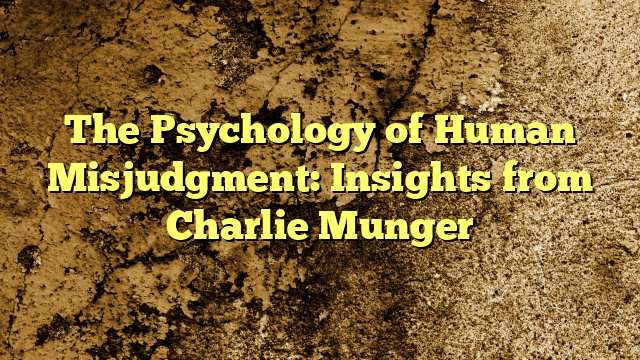The Psychology of Human Misjudgment: Insights from Charlie Munger
The Psychology of Human Misjudgment: Insights from Charlie Munger
Charlie Munger, the vice chairman of Berkshire Hathaway and long-time business partner of Warren Buffett, is known for his deep understanding of human psychology and its impact on decision-making. In a famous speech given at Harvard University in 1995, Munger outlined 25 cognitive biases that can lead to misjudgment and poor decision-making. These insights are not only valuable for investors and business leaders, but also for anyone interested in understanding the quirks of human behavior.
Some of the key insights from Munger’s speech include:
- 1. Confirmation Bias: People tend to seek out information that confirms their existing beliefs and ignore evidence that contradicts them.
- 2. Social Proof: People are influenced by the actions and opinions of others, often leading to herd behavior and groupthink.
- 3. Overconfidence: People tend to overestimate their own abilities and knowledge, leading to risky decision-making.
- 4. Availability Heuristic: People tend to overestimate the likelihood of events that are easily recalled from memory, leading to skewed perceptions of risk.
- 5. Anchoring: People tend to rely too heavily on the first piece of information they receive when making decisions, leading to biased judgments.
These cognitive biases can have a profound impact on our everyday lives, influencing everything from the products we buy to the way we interact with others. By understanding these biases, we can become more aware of our own thought processes and make better decisions as a result.
One way to visualize the impact of these biases is through a table:
| Bias | Description | Impact |
|---|---|---|
| Confirmation Bias | Seeking out information that confirms existing beliefs | Reinforces existing biases and limits exposure to new ideas |
| Social Proof | Being influenced by the actions and opinions of others | Can lead to herd behavior and groupthink |
| Overconfidence | Overestimating one’s own abilities and knowledge | Can lead to risky decision-making and failure to seek out additional information |
| Availability Heuristic | Overestimating the likelihood of events that are easily recalled from memory | Can lead to skewed perceptions of risk and probability |
| Anchoring | Relying too heavily on the first piece of information received | Can lead to biased judgments and failure to consider alternative perspectives |
By recognizing these biases in ourselves and others, we can take steps to mitigate their impact and make more rational decisions. This can be particularly important in the world of investing, where cognitive biases can lead to costly mistakes. Munger’s insights have been influential in the world of finance, helping investors to avoid common pitfalls and make more informed decisions.
Ultimately, understanding the psychology of human misjudgment can help us to navigate the complexities of the modern world with greater clarity and insight. By being aware of our own cognitive biases and those of others, we can make better decisions, build stronger relationships, and lead more fulfilling lives.

